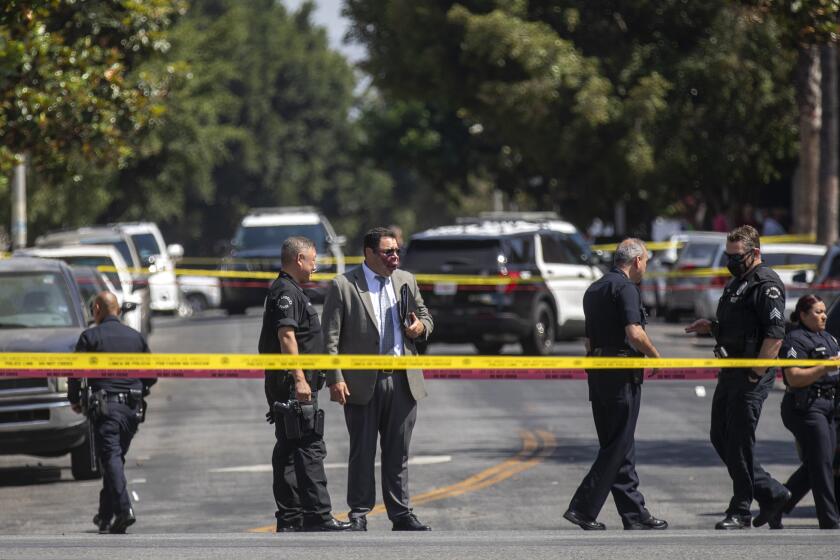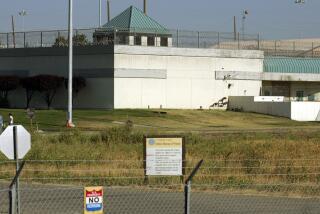Derek Chauvin, former officer who killed George Floyd, is moved to Arizona prison

- Share via
Derek Chauvin has been moved from a Minnesota state prison where he was often held in solitary confinement to a medium-security federal prison in Arizona, where the former police officer convicted of murdering George Floyd may be held under less-restrictive conditions.
Chauvin was taken Wednesday from a maximum-security prison in a Minneapolis suburb, where he often spent most of his day in a 10-foot-by-10-foot cell, to the Federal Correctional Institution in Tucson, according to the Bureau of Prisons.
The Tucson facility houses 266 incarcerated people, both male and female, as part of a larger complex that includes a high-security penitentiary and a minimum-security satellite camp.
Bureau of Prisons spokeswoman Randilee Giamusso declined to detail the circumstances of Chauvin’s confinement, citing privacy, safety and security concerns.
Experts said earlier that Chauvin was likely to be safer in the federal system. It typically houses less-violent inmates, and he’d be less likely to mix with people he had arrested or investigated as a Minneapolis police officer.
“It’s dangerous to be an officer in any prison,” former U.S. Atty. Tom Heffelfinger said after Chauvin was sentenced last month. “It’s even more dangerous in state prison because of the nature of the inmate population. There are gangs, for example. And police officers just don’t do well there. Those risks are reduced in a federal prison.”
Voters in Los Angeles have serious concerns about the LAPD but little desire for a smaller force amid increased crime, according to a new poll.
The federal prison system does house many high-profile people, but it, too, is plagued by gangs and chronic violence. The entire federal prison system was put on a nationwide lockdown in January after two prisoners were killed and two others injured during a gang altercation at a penitentiary in Texas.
The Bureau of Prisons has also faced increasing scrutiny of violent incidents and serious misconduct in its ranks. Associated Press investigations have uncovered abuse, neglect and leadership missteps, including rampant sexual abuse by workers, severe staffing shortages, prisoner escapes and the mishandling of the COVID-19 pandemic.
Chauvin was sentenced last month in U.S. District Court in St. Paul, Minn., to 21 years on federal civil rights charges after pleading guilty in an agreement with prosecutors. He was already serving 22½ years for his conviction in state court on murder and manslaughter charges; a condition of the agreement called for the sentences to be served concurrently and in federal prison.
Chauvin, who is white, killed Floyd, a Black man, by pinning him to the pavement with his knee for 9½ minutes as bystander video captured Floyd struggling to breathe and crying out for help. Floyd was suspected of passing a counterfeit bill at a nearby grocery store.
Abel Concho pleaded guilty to one count of making false statements. He knew that sex with an inmate cannot be considered consensual, prosecutors said.
Floyd’s death May 25, 2020, touched off a firestorm of protests around the world and refocused attention on police brutality and racism.
U.S. District Judge Paul Magnuson suggested when sentencing Chauvin that he be placed near family who live between Iowa and Minnesota. But federal officials are not bound by judicial requests.
Last month Magnuson also sentenced former Minneapolis Police Officer J. Alexander Kueng to three years in prison and former Officer Tou Thao to 3½ years on criminal civil rights charges related to the Floyd killing. They intend to appeal their sentences. Earlier in July, former Officer Thomas Lane was sentenced to 2½ years. He’s been ordered to report to a low-security federal prison camp in Colorado later this month.
More to Read
Sign up for Essential California
The most important California stories and recommendations in your inbox every morning.
You may occasionally receive promotional content from the Los Angeles Times.












